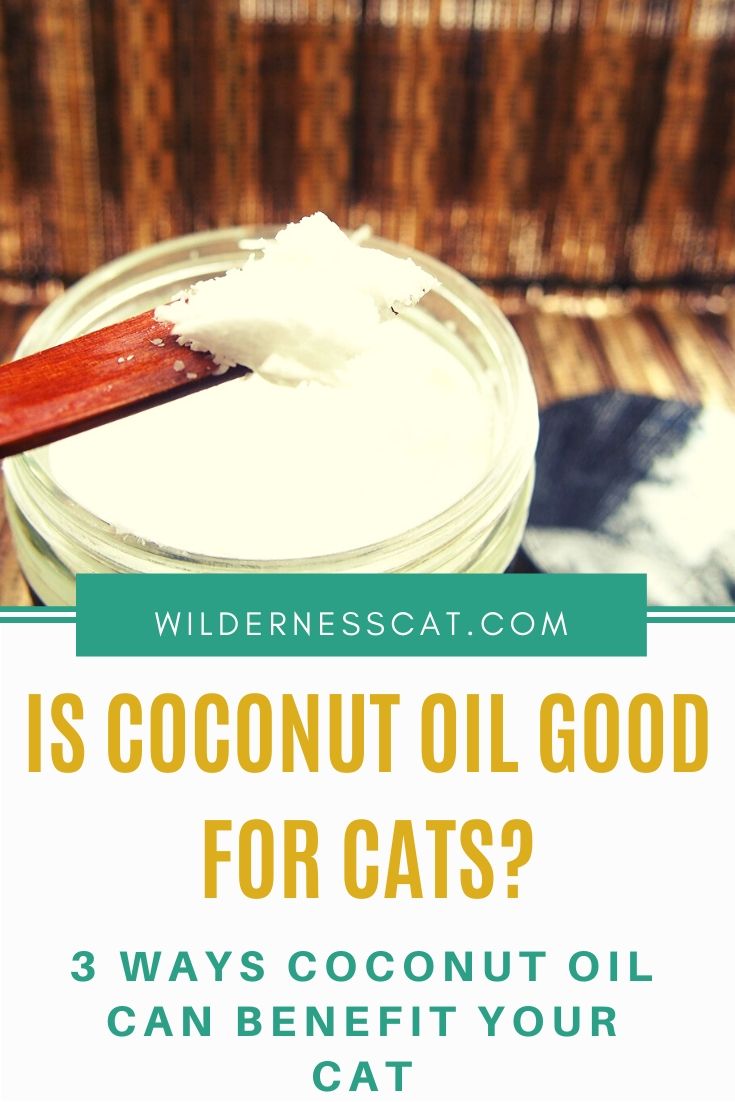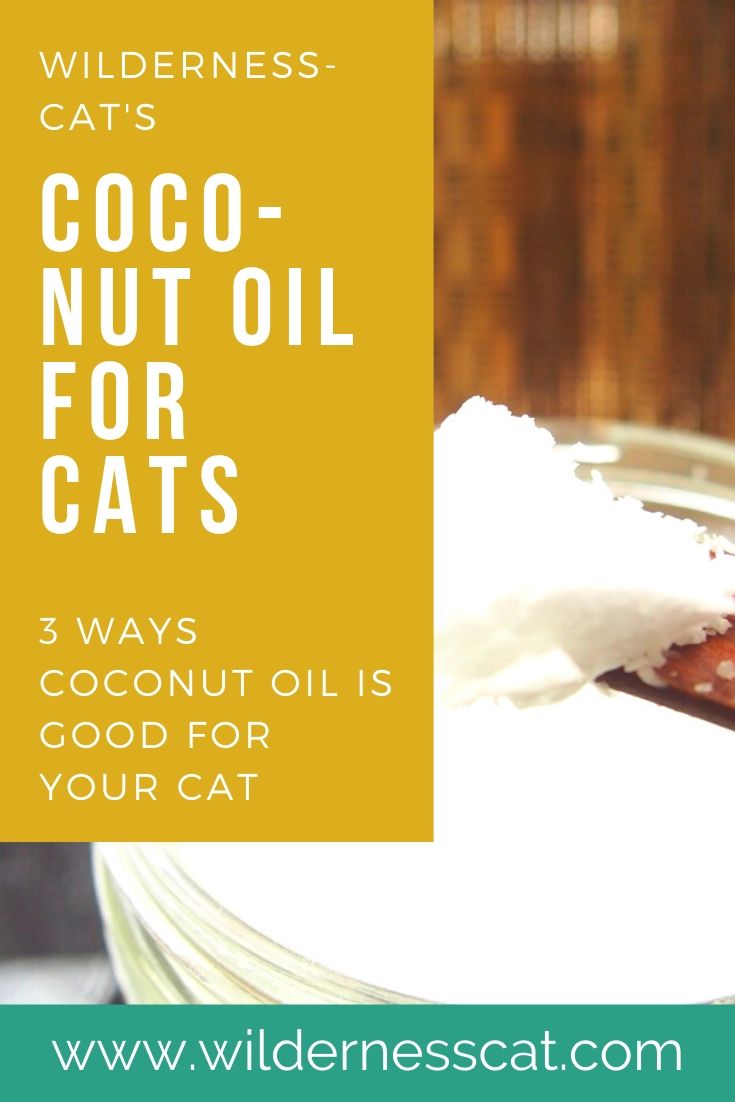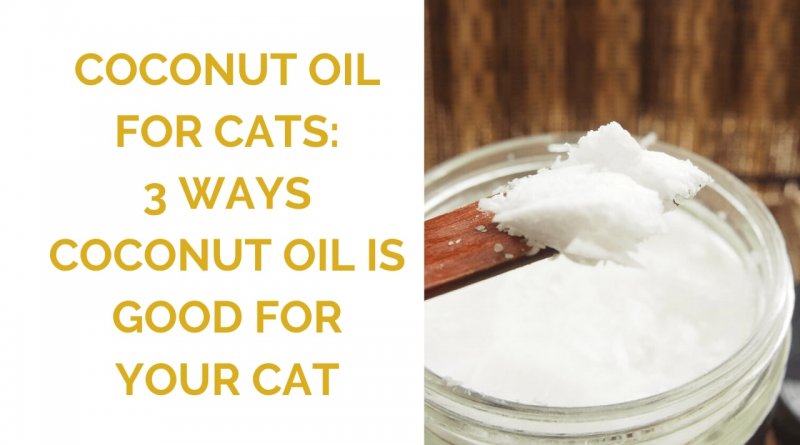Coconut Oil for Cats: 3 Ways Coconut Oil is Good for Your Cat
Last Updated on
Coconut oil has gotten a bit of good press in the last few years. The range of its supposed abilities is vast, which should make any thoughtful observer scratch their head. Any miracle oil that can clean teeth, help digestive health, kill bacteria, and make skin smoother than a hairless kitten’s bottom is probably more placebo than panacea…right?
At Wildernesscat, we don’t just tout the powers of natural remedies without good reason. And when it comes to something as trendy as coconut oil, we’re particularly aware of the potential for exaggeration. That said, we’re always on the lookout for effective natural solutions for cat health issues. And we’re happy to say that coconut oil has the potential to be a truly beneficial health supplement for cats. Let’s find out how.
Quick Navigation
- 1. What makes coconut oil good for cats?
- 2. Is coconut oil safe for cats?
- 3. Three ways you can use coconut oil on your cat.
- 4. Conclusion: Is coconut oil good for cats?
Disclaimer: Some of the product links in this article are affiliate links and Wildernesscat will receive a percentage of the sale. It doesn’t cost any extra if you buy through the links but helps us to continue sharing the radical cat parenting message. Thank you!
What makes coconut oil good for cats?
Let’s take a closer look at some of the common reasons people argue that coconut oil is good for cats.
Coconut oil is primarily saturated fat.
Coconut oil is approximately 90% saturated fat—the kind of fat known for increasing cholesterol and the risk of heart disease. So, how is coconut oil being composed of primarily saturated fat a good thing?
Cats’ bodies don’t react to saturated fat in the same way that humans do. A 2012 study conducted by the University of Glasgow and the WALTHAM Centre for Pet Nutrition found that an increase of fat didn’t affect the cholesterol level or weight of healthy cats.
In fact, a cat’s natural carnivorous diet is rich in saturated animal fats. Fat is an essential component of a cat’s diet and helps the body in many ways. It’s a concentrated source of energy, can help to absorb fat-soluble vitamins and nutrients, and more.
While saturated fat isn’t bad for your cat, this doesn’t mean coconut oil is the best option for cats. Animal-sourced fats are a better choice for cats than plant fats. If you believe your cat needs more fat in their diet, look into finding a high-fat food rather than stopping at a coconut oil supplement.
Coconut oil is comprised of a special combination of fatty acids.
Coconut oil is made of a unique combination of fatty acids: caprylic acid, lauric acid, and capric acid. These fatty acids are medium-chain triglycerides, meaning they’re more easily digested by the body and can provide quick energy.
The most prevalent fatty acid in coconut oil is lauric acid. Almost 50% of coconut oil’s fatty acid makeup is lauric acid. It’s powerful stuff, too.
Lauric acid can fight fungal, viral, and bacterial infections. It is used as a medication for diseases like flu, herpes, bronchitis, ringworm, and more.
Is coconut oil safe for cats?
Coconut oil isn’t a natural part of the feline diet and does come with risks. Too much coconut oil can cause stomach upset and diarrhea, so monitor how your cat reacts to the coconut oil and dose accordingly. Not every cat likes the flavor of coconut oil, either, so if it’s putting your cat off their food, don’t try to force them to eat it.
Coconut oil is really high in calories, too. One tablespoon contains just over 100 calories. That’s half of your cat’s daily calorie requirement. If you’re worried about your cat consuming too many calories, coconut oil could push them over the limit.
External application of coconut oil is very low risk—so feel free to rub a little into your cat’s coat or on chapped paw pads.
As always, it’s best to supervise your cat and watch how they react to the coconut oil. If it’s not working for your cat, don’t force it!
Three ways you can use coconut oil on your cat.
Coconut oil for natural cat teeth cleaning.
Considering that periodontal disease—the most common clinical condition among cats—affects an atrocious portion of the pet population, this is essential knowledge.
Coconut oil contains a high concentration of lauric acid, known for its antimicrobial and anti-inflammatory properties, which is great for fighting plaque and gingivitis. When coupled with the other natural dental care solutions we’ve recommended, coconut oil can help maintain dental health.
For natural cat teeth cleaning, the recommended amount is one teaspoon per ten pounds of body weight, administered once daily. You can apply the oil directly to your cat’s teeth and gums, or mix it into their food. Coconut oil has a very low melting point of just 97 degrees Fahrenheit, so you can safely give it to your cat both in its solid and liquid forms.
Make sure that you are using virgin coconut oil. Coconut oil refined for high heat cooking is missing some of the vital components that make the oil so beneficial.
Whether your cat is a kitten who still has its baby teeth or an older cat who just had most of its teeth extracted, it’s never too early or too late to start giving your cat’s mouth a little extra TLC through regular applications of coconut oil.
Coconut oil as a hairball remedy.
For years, people have been using petroleum jelly to help their cats to pass hairballs. A more nutritious alternative is coconut oil. It has the same lubricating effect as petroleum jelly, while also offering bonus health benefits. You can administer coconut oil for hairballs by giving your cat 1/2 a teaspoon a few times a week.
If your cat enjoys the flavor of coconut oil (many cats do!), you can feed it as a treat. But if your cat doesn’t seem terribly interested in the coconut oil, you can “trick” them into eating it. Apply the coconut oil to your cat’s paw and let them lick it off.
Coconut oil for cats’ dry skin and a healthier coat.
Coconut oil is like lotion for your cat. If their skin is dry, flaky, and itchy, try coconut oil. It’s been used to treat cats suffering from uncomfortable skin conditions.
You can gently massage a teaspoon of oil into your cat’s fur and skin below. Healthy skin leads to a healthier coat and the coconut oil works as a conditioner to keep your cat’s coat healthy. You’ll notice their fur looking shinier and healthier.
Coconut oil also works to help heal and moisturize chapped paws.
For more information on how to soothe and heal your cat’s dry skin holistically, check out our article on the Best Natural Remedies for Dry Skin in Cats.
Conclusion: Is coconut oil good for cats?
Coconut oil isn’t a great choice as a source of dietary fat for cats but it can help to lubricate your cat’s system when ingested. It can help hairballs and other foreign objects go down smoothly.
Coconut oil also contains a high concentration of lauric acid. Lauric acid, with its antibacterial and antimicrobial properties, can fight unwanted organisms in your cat’s body. We’re talking about the bacteria that lead to periodontal disease—coconut oil, along with appropriate dental care, can help to prevent dental disease.
Coconut oil can also help to moisturize your cat’s dry skin and heal minor skin abrasions.
Did you find this article useful? Pin it for later!











